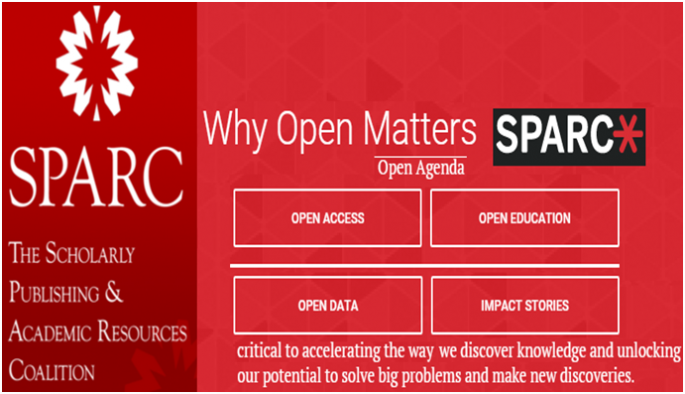SPARC has launched an Open Agenda: Open Access, Open Data, and Open Education

Open Access, Open Data, and Open Education form a broad SPARC’s Open Agenda that is critical to accelerating the way we discover and exchange knowledge, and unlocking our potential to solve big problems and make new discoveries.
 SPARC (the Scholarly Publishing and Academic Resources Coalition) is a global coalition committed to making Open the default for research and education. Thus SPARC empowers people to solve big problems and make new discoveries through the adoption of policies, guidelines and practices that advance Open Access, Open Data, and Open Education.
SPARC (the Scholarly Publishing and Academic Resources Coalition) is a global coalition committed to making Open the default for research and education. Thus SPARC empowers people to solve big problems and make new discoveries through the adoption of policies, guidelines and practices that advance Open Access, Open Data, and Open Education.
Over 200 SPARC’s members are primarily academic and research libraries located in the U.S. and Canada, who use the resources and support provided by SPARC to actively promote Open Access to scholarly articles, the open sharing of research data, and the creation and adoption of Open Educational Resources on their campuses.
The advent of the Internet and its social and news websites has fundamentally changed the way we create, exchange and interact with knowledge. Today, we have the unprecedented ability to use, adapt, and build on knowledge (see: Open Knowledge global movement; CIARD: Open Agriculture Knowledge for Development) aiming in real time to solve problems and make new discoveries..
According to SPARC, the most significant challenge to realizing the full potential of the Internet lies in our ability to advance the virtues of
openness and open access, for the benefit of practitioners, investors, and the public at large.
For many years, SPARC has been best known for its advocacy on openscholarly communications landscapeand recently added programs promoting open data and educational resources. As things have progressed, SPARC comes to view open access, open data, and open education as essential components of a much broader “Open Agenda.”
Since January 2016 SPARC has embraced the Open Agenda (Open Access, Open Data, and Open Education) as a comprehensive platform to share knowledge and foster innovation. The Open Agenda has been efficiently promoted through a completely revamped website at a new location: sparcopen.org where you can find the wealth of resources (like the Author Addendum, the Open Access Spectrum Tool, Policy Talking Points and Primers (see: Article-Level Metrics)) along with stories detailing the impact of the Open Agenda (see: Battling Disease with Open: Open Source Malaria Consortium).
An open approach to scholarship and education has myriad benefits for scholars, researchers (included early career academic professionals), students, educators, and investors. In particular, openly published works has the widest possible audience, leverage an open approach to create customized research and education programs (using the latest relevant information), improve relative outcomes, increase understanding and collaboration across borders and institutions, secure future funding and foster career advancement.
Upcoming SPARC Events:
Fair Use Week 2016, February 22-26, 2016
Open Education Week 2016, March 7-11, 2016
Source: Why Open Matters? (SPARC)
See also:
Open Belgium 2016 (29 -02-2016)
First ECSA Conference: First Citizen Science - Innovation in Open Science, Society and Policy (19-05-2016 to 21-05-2016, Berlin)
European Open Science Cloud for Research (EOSC) Workshop (05-02- 2016, Rome)
Open Access, Open Data, Open Science
OpenEdition and OpenAIRE – experiments in open peer review
Open access, open data, open science…what does “openness” mean in the first place?
Towards Open Science to face agriculture challenges
When we embrace open, what is possible? We would appreciate hearing your opinion here!

